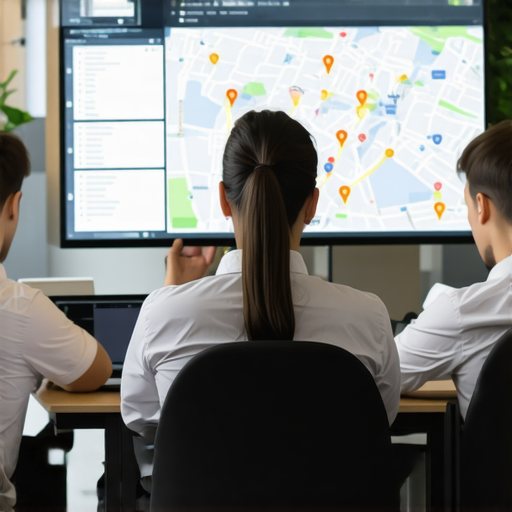My First Encounter with Google Maps Optimization: A Personal Tale
I still remember the day I decided to focus on local SEO, particularly optimizing for Google Maps. As a small business owner, I wanted to boost my visibility without breaking the bank. I dove into countless articles and forums, trying to understand the nuances of local listings. That initial step was daunting but incredibly rewarding once I started seeing my business appear on the map more frequently.
Unlocking the Secrets to Top Google Maps Rankings
Over the years, I’ve experimented with various tactics to improve my Google Maps presence. One of the most effective strategies was consistent Google My Business optimization. Ensuring all my business details were accurate, engaging with reviews, and uploading high-quality photos made a noticeable difference. These small yet impactful actions helped me climb the local search results and attract more customers.
How Do I Keep Up with the Rapid Changes in Google Maps Algorithms?
Google’s algorithms are constantly evolving, and staying ahead requires continuous learning. I subscribe to industry blogs and follow updates from Google’s official channels. For instance, I regularly check Search Engine Land for the latest insights. This proactive approach allows me to adapt my strategies promptly, ensuring my business remains visible in competitive local markets.
What Are the Top Strategies for 2024?
In 2024, I found that integrating local SEO with broader digital marketing efforts yields the best results. This includes leveraging top Google Maps visibility tactics, optimizing for voice search, and actively engaging with customer reviews. Additionally, maintaining a mobile-friendly website complements my Google Maps efforts, making it easier for potential clients to find and contact me.
Is it Possible to Achieve Long-Term Success with Google Maps Optimization?
Absolutely! From my experience, consistency and genuine engagement are key. Regularly updating your profile, responding to reviews authentically, and utilizing local keywords naturally helps build authority over time. Remember, Google favors businesses that actively engage with their community both online and offline.
If you’re serious about boosting your local presence, I highly recommend exploring comprehensive resources like these expert tips. Have you tried any of these tactics? Share your experiences in the comments below—I’d love to hear your success stories or challenges!
What Are the Nuances of Local Search Algorithms That Experts Need to Know?
Understanding the intricacies of Google Maps’ local search algorithms is essential for maintaining a competitive edge. Unlike broad SEO, local rankings are influenced heavily by proximity, relevance, and prominence. Google evaluates these factors through complex signals such as review quality, consistency of NAP (Name, Address, Phone Number) data, and user engagement metrics. Staying ahead involves not just implementing standard practices but delving into algorithm updates and their impact on local visibility.
Implementing Advanced Optimization Tactics for 2024
In the ever-evolving landscape of local SEO, innovative strategies are vital. For instance, leveraging structured data markup like Schema.org can enhance your business listing’s visibility by providing search engines with more context. Additionally, optimizing for voice search is increasingly important; using conversational keywords and FAQs can help your business appear in voice-activated queries. Combining these tactics with a robust review management system ensures your business remains authoritative and trustworthy.
Incorporating high-quality, geo-relevant images can significantly boost local engagement. Regularly updating photos and encouraging satisfied customers to share their experiences can improve your profile’s attractiveness and credibility. Remember, visual content not only attracts clicks but also influences local rankings indirectly through increased user interaction.
How Can a Holistic Digital Marketing Approach Enhance Local SEO?
Integrating Google Maps optimization within a broader digital marketing strategy amplifies your local presence. For example, creating locally optimized content on your website, such as blog posts addressing community events or local news, signals relevance to Google. Additionally, consistent citation building across reputable directories reinforces your local authority. To streamline efforts, consider partnering with specialized agencies—like the best Google Maps agencies—who can provide tailored strategies that align with your business goals.
Could Emerging Technologies Transform Local SEO Tactics?
Emerging innovations such as AI-powered chatbots and augmented reality (AR) experiences present exciting opportunities to engage local audiences uniquely. For example, AR can offer virtual tours or interactive maps that showcase your business location dynamically. AI tools can analyze vast amounts of review data to identify sentiment trends, helping you tailor your engagement strategy more effectively. Staying informed about these technological shifts allows local businesses to adapt proactively, ensuring sustained visibility and customer loyalty.
If you’re eager to deepen your understanding, I recommend exploring more expert insights and case studies in local SEO—these resources can guide you through complex implementation challenges and help you stay ahead in 2024. Have you experimented with any of these advanced tactics? Share your experiences or questions in the comments; I love hearing how local SEO strategies evolve in real-world applications!
Why Deeply Understanding Local Search Signals Transformed My Strategy
As I delved deeper into local SEO, I realized that grasping the subtle nuances of Google Maps’ ranking factors was a game-changer. It wasn’t just about listing my business and hoping for the best; it was about decoding the complex signals that Google uses to evaluate local relevance and prominence. For instance, I started paying closer attention to my review patterns, ensuring I encouraged satisfied customers to leave detailed, positive feedback that highlighted specific services. This approach, inspired by insights from Search Engine Land, helped me understand that review quality and consistency are pivotal in boosting local rankings. By aligning my efforts with these nuanced signals, I was able to craft a more sophisticated and effective local SEO strategy.
How Incorporating Structured Data and Voice Search Optimization Elevated My Results
Integrating structured data markup like Schema.org into my website was initially intimidating, but it proved invaluable. This step provided search engines with richer context about my business, enhancing my visibility in local packs and map results. Simultaneously, I started optimizing for voice search by focusing on conversational keywords and FAQs that potential customers might use in voice queries. This dual approach, which I explored more thoroughly on these expert tips, significantly improved my chances of appearing in voice-activated local searches. The synergy between structured data and voice optimization created a robust, future-proof foundation for my local SEO efforts.
What Are the Challenges of Maintaining Local Authority in a Competitive Market?
Keeping my local authority strong in a fiercely competitive environment required ongoing effort and strategic thinking. I learned that citation consistency across multiple directories was crucial; discrepancies could harm my prominence. Additionally, engaging authentically with reviews—responding personally and promptly—built trust and credibility. I also discovered that community involvement, such as sponsoring local events or participating in neighborhood activities, subtly influenced my prominence. These offline efforts complemented my online optimization, reinforcing my business’s reputation locally. The challenge was balancing these activities without spreading myself too thin, but the payoff—sustained visibility and customer loyalty—made it worthwhile.
How Do Advanced Technologies Like AI and AR Fit Into My Local SEO Strategy?
Emerging technologies have opened exciting new frontiers. For example, I experimented with AI-powered review analysis tools that helped me identify sentiment trends and areas for improvement, making my engagement more strategic. Augmented reality (AR) offers immersive ways for customers to experience my business remotely—virtual tours or interactive maps can set me apart. According to industry reports, integrating AR into local marketing can enhance customer engagement and brand recall. Staying ahead means embracing these innovations early, testing their impact, and adapting my strategies accordingly. It’s fascinating to see how these technologies can turn ordinary local listings into dynamic, interactive experiences that resonate deeply with modern consumers.
If you’re keen on elevating your local SEO game, I invite you to explore these advanced tactics further. Share your experiences or questions in the comments—I genuinely enjoy exchanging insights and learning from fellow local marketers. Remember, mastering the nuances of local search is a continuous journey, but with curiosity and perseverance, the rewards are well within reach.
Mastering the Nuances of Local Search Algorithm Signals
As my journey into local SEO matured, I discovered that understanding the subtle intricacies of Google Maps’ ranking factors was pivotal for sustained success. Beyond basic optimization, delving into how proximity, relevance, and prominence interplay allows businesses to craft more targeted strategies. Google assesses these elements through complex signals such as review quality, NAP (Name, Address, Phone Number) consistency, and user engagement metrics. Staying ahead necessitates not only implementing standard practices but also monitoring algorithm updates and their specific impacts on local visibility. This proactive approach empowers me to adapt swiftly, maintaining a competitive edge in dynamic markets.
Leveraging Structured Data and Voice Search for Elevated Local Presence
Integrating structured data markup, particularly Schema.org, has been transformative in enhancing my business profile’s visibility. By providing search engines with detailed, contextual information, I facilitated richer snippets and improved local pack appearances. Simultaneously, optimizing for voice search—focusing on natural language queries and frequently asked questions—expanded my reach into the growing voice-activated search space. According to industry insights from Search Engine Land, these tactics are no longer optional but essential for future-proofing local SEO efforts. The synergy between structured data and voice optimization not only amplifies visibility but also aligns with evolving consumer behaviors.
How Do Emerging Technologies Like AI and AR Reinvent Local SEO?
Emerging technological innovations present unprecedented opportunities to differentiate local businesses. For instance, AI-powered review analysis tools help me identify sentiment trends and areas needing improvement, enabling more strategic engagement. Augmented reality (AR) introduces immersive experiences—virtual tours or interactive maps—that captivate users and foster deeper connections. Industry reports highlight that integrating AR into local marketing strategies can significantly boost customer engagement and brand recall. Staying at the forefront involves experimenting with these tools, measuring their impact, and continuously refining my approach to create memorable, interactive local experiences.
Incorporating high-quality, geo-relevant images can dramatically enhance local engagement. Regularly updating visuals and encouraging satisfied customers to share their experiences elevate your profile’s credibility and appeal. Visual content not only attracts clicks but also influences local rankings indirectly through increased user interaction. An optimized image strategy complements textual efforts, creating a comprehensive and compelling online presence.
How Can a Holistic Digital Strategy Amplify Local SEO Results?
Aligning Google Maps optimization within a broader digital marketing framework magnifies its impact. Creating locally tailored content—like blog posts about community events or local news—signals relevance to Google and strengthens your local relevance. Consistent citation building across reputable directories further bolsters your authority. Partnering with expert agencies, such as the top Google Maps agencies, can streamline this integration, ensuring strategies are tailored to your unique business landscape. This comprehensive approach fosters trust, visibility, and sustained growth.
Could Innovative Technologies Redefine Local SEO Tactics?
Technologies like AI and AR are reshaping local SEO paradigms. AI-powered tools analyze vast review data, uncovering sentiment patterns that inform engagement strategies. AR offers immersive virtual experiences—such as virtual storefronts or interactive maps—that captivate local audiences and foster memorable brand interactions. Industry analyses suggest early adoption of these innovations can lead to a significant competitive advantage. Embracing these tools requires a mindset of experimentation and continuous learning, but the potential rewards—increased engagement and customer loyalty—are substantial. To explore these possibilities, I recommend staying connected with authoritative sources and case studies that showcase successful integrations.
Why Deeply Understanding Local Search Signals Transformed My Strategy
Gaining a nuanced understanding of local search signals revolutionized my approach. It became clear that local rankings are influenced by an intricate web of factors—review quality, citation consistency, community engagement—that need precise attention. For example, I began encouraging detailed reviews that highlight specific services, inspired by insights from Search Engine Land. This focus on review richness and consistency significantly boosted my prominence. Recognizing and decoding these signals allowed me to craft a sophisticated, data-driven strategy that continuously adapts to the evolving landscape, ensuring my business remains visible and authoritative in local searches.
How Integrating Structured Data and Voice Optimization Elevated My Results
Implementing Schema.org markup provided search engines with richer business context, enhancing my visibility in local packs and map results. Concurrently, optimizing for voice search—using conversational keywords and FAQ content—expanded my reach into voice-activated queries. Industry experts emphasize that these tactics are critical for staying ahead in local SEO. The combined effect created a resilient, future-proof foundation that aligns with consumer trends, ensuring my business remains accessible through emerging search modalities.
What Are the Challenges of Maintaining Local Authority in Competitive Markets?
Maintaining local authority amidst intense competition requires relentless effort. Consistency in citations across directories is paramount; discrepancies can undermine prominence. Engaging authentically with reviews—responding personally and promptly—builds trust and credibility. Offline community involvement, such as sponsoring local events, subtly enhances my reputation and prominence. Balancing online and offline efforts is challenging but essential. The payoff—sustained visibility and loyal customers—justifies the dedication. Embracing innovative tools like review analysis platforms and AR experiences further reinforces my local authority, creating a resilient and dynamic local presence.
How Do Advanced Technologies Like AI and AR Fit Into My Local SEO Strategy?
Integrating AI and AR has been instrumental in transforming my local marketing approach. AI tools analyze review sentiment, providing actionable insights for targeted engagement. AR offers immersive virtual tours that attract and retain customer interest. Industry research from sources like Search Engine Land underscores that early adoption of these technologies can set businesses apart. Experimenting with these innovations, measuring outcomes, and refining strategies are ongoing processes that ensure my local SEO efforts remain innovative and effective. These tools allow me to create memorable, interactive experiences that resonate deeply with local audiences, fostering loyalty and distinction in competitive markets.
If you’re committed to elevating your local SEO efforts, I encourage you to explore these advanced tactics and share your experiences or questions. The journey toward mastery is continuous, but the rewards—greater visibility, engagement, and loyalty—are well worth the effort.
Things I Wish I Knew Earlier (or You Might Find Surprising)
Mastering the Power of Authentic Engagement
Early in my journey, I underestimated how much genuine interaction with customers could impact my Google Maps rankings. Responding thoughtfully to reviews and encouraging real feedback created a sense of community that Google noticed, boosting my visibility more than any keyword tweak. It’s a simple tip, but one I wish I had embraced sooner.
The Subtle Art of Consistent NAP Data
Consistency in my business’s Name, Address, and Phone Number across all platforms was a detail I overlooked initially. Inconsistent NAP data can dilute your local authority, so I spent time auditing and correcting my listings. This small step had surprisingly big results, reinforcing the importance of meticulous data management.
Visual Content as a Trust Builder
Uploading high-quality, geo-relevant photos regularly transformed my profile from standard to compelling. I discovered that visual content not only attracts clicks but also influences rankings indirectly through increased user engagement. A picture really is worth a thousand clicks—and perhaps a few extra local rankings too.
Embracing Emerging Technologies
Utilizing tools like AI review analysis and experimenting with AR experiences initially felt intimidating. However, integrating these technologies into my local SEO strategy provided a fresh edge and helped me stand out. It’s clear that staying open to innovation is essential for long-term success in local markets.
Understanding Local Search Signals Deeply
Delving into the nuances of proximity, relevance, and prominence changed how I approached optimization. Instead of broad tactics, I tailored my efforts to target the specific signals Google values most. This granular focus made my efforts more effective and sustainable.
Resources I’ve Come to Trust Over Time
- Search Engine Land: A goldmine for industry updates and algorithm insights that helped me stay current and adapt strategies quickly.
- Google’s Official Blog: Trustworthy and direct source for official updates on Google Maps and local search changes.
- Neil Patel’s Blog: Offers practical, easy-to-understand tips on local SEO tactics that I’ve found invaluable for my growth.
Parting Thoughts from My Perspective
Reflecting on my journey with Google Maps optimization, I realize that the most impactful lessons are about authenticity, consistency, and embracing innovation. While algorithms evolve rapidly, the core principles of providing value and engaging genuinely with your community remain constant. If you’re serious about boosting your local presence, start with these foundational practices, stay curious about emerging tools, and remember that real growth takes time and patience. If this resonated with you, I’d love to hear your thoughts—feel free to share your experiences or questions below. Sharing this with someone who might find it helpful is also appreciated. Here’s to your success in local SEO!



